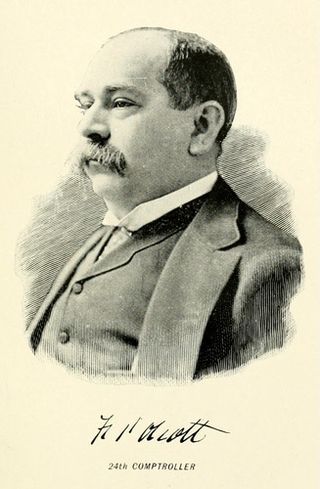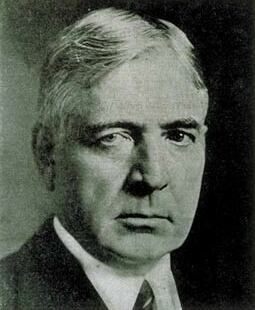Washington Irving Lincoln Adams (February 22, 1865- January 20, 1946) was an American Republican Party politician, banker and soldier.
Contents

Washington Irving Lincoln Adams (February 22, 1865- January 20, 1946) was an American Republican Party politician, banker and soldier.

Washington I. L. Adams was a direct descendant of Henry Adams, who settled in Braintree, Massachusetts in 1636, and also of Presidents John Adams and John Quincy Adams.
He was a founder and President of the Montclair Trust Company, the Murray Hill Trust Company, and the West Side Bank of New York. He served as President of Styles & Cash, a New York City printing and stationery firm.
In 1912, Adams was the Republican nominee for the U.S. House of Representatives in New Jersey's 10th congressional district. The incumbent, Democrat Edward W. Townsend, had been elected to Congress in the 1910 Democratic landslide that helped Woodrow Wilson win election as Governor of New Jersey. Townsend was re-elected in 1912 (with Wilson running for President) with 10,854 votes, with former Assemblyman William F. Morgan (running as a Progressive with Theodore Roosevelt) receiving 7,847 votes. Adams (on a ticket with William Howard Taft finished third with 7,111 votes. [1]
During World War I, Adams, at the age of 52, was commissioned a Major in the U.S. Army and was the Officer In Charge of Finance for the Eastern Division, Quartermaster Corps. [2]
Adams was a member of the Electoral College in 1916, voting for Charles Evans Hughes, and was an unsuccessful candidate for Elector in 1932. In 1932, Adams was elected Town Commissioner in Montclair, New Jersey and served until 1936.
Adams was a member of the Sons of the American Revolution and served as its President General from 1922 until 1923. [3]

The 1912 United States presidential election was the 32nd quadrennial presidential election, held on Tuesday, November 5, 1912. Democratic governor Woodrow Wilson of New Jersey unseated incumbent Republican president William Howard Taft while defeating former president Theodore Roosevelt and Socialist Party nominee Eugene V. Debs.

The 1916 United States presidential election was the 33rd quadrennial presidential election, held on Tuesday, November 7, 1916. Incumbent Democratic President Woodrow Wilson narrowly defeated former associate justice of the Supreme Court Charles Evans Hughes, the Republican candidate.

Charles Gates Dawes was an American diplomat and Republican politician who was the 30th vice president of the United States from 1925 to 1929 under Calvin Coolidge. He was a co-recipient of the Nobel Peace Prize in 1925 for his work on the Dawes Plan for World War I reparations.

Edward Irving Edwards was an American attorney, banker, and Democratic Party politician who served as the 37th Governor of New Jersey from 1920 to 1923 and represented the state in the United States Senate from 1923 to 1929. He was a leading critic of Prohibition.

Sheila Yvette Oliver was an American politician who served as the second lieutenant governor of New Jersey from 2018 until her death in 2023. A member of the Democratic Party, Oliver was the first Black woman to serve as lieutenant governor of New Jersey and was the first woman of color elected to statewide office in New Jersey.

Robert Winthrop Kean was an American Republican Party politician from the state of New Jersey. Kean represented parts of Essex County, New Jersey in the United States House of Representatives from 1939 to 1959. He retired from the House to run for United States Senate in 1958, but was defeated by Harrison A. Williams.

Henry Otto Wittpenn was an American politician who served as the Mayor of Jersey City, New Jersey, from January 1, 1908, to June 16, 1913. He was a member of the New Jersey State Highway Commission and was the president of both the Hoboken Land and Improvement Company and the First National Bank of Hoboken. He was also a director of the First National Bank of Jersey City.

The Progressive Party, popularly nicknamed the Bull Moose Party, was a third party in the United States formed in 1912 by former president Theodore Roosevelt after he lost the presidential nomination of the Republican Party to his former protégé turned rival, incumbent president William Howard Taft. The new party was known for taking advanced positions on progressive reforms and attracting leading national reformers. The party was also ideologically deeply connected with America's radical-liberal tradition. After the party's defeat in the 1912 United States presidential election, it went into rapid decline in elections until 1918, disappearing by 1920. The "Bull Moose" nickname originated when Roosevelt boasted that he felt "strong as a bull moose" after losing the Republican nomination in June 1912 at the Chicago convention.

Frederic Pepoon Olcott was an American banker and politician.
Walter Gilbert Alexander I was an American physician and Republican politician from New Jersey. He was president of the National Medical Association and the first African American to serve in the New Jersey Legislature.

Benjamin Strong Jr. was an American banker. He served as Governor of the Federal Reserve Bank of New York for 14 years until his death. He exerted great influence over the policy and actions of the entire Federal Reserve System and indeed over the financial policies of all of the United States and Europe.
John N. Dennis is an American Republican Party politician and business executive who served in the New Jersey General Assembly from 1968 to 1974, and again from 1976 to 1978.
Betty Wilson is an American Democratic Party politician who served in the New Jersey General Assembly from 1974 to 1976 and later held posts in the administrations of President Jimmy Carter and under three Democratic New Jersey governors.
John William Suling was an American Democratic Party politician who was twice the Democratic nominee for the U.S. House of Representatives in New Jersey's 12th congressional district.

Dallas Selwyn Townsend Sr. was an American Republican Party official who served as the Assistant United States Attorney General during the Eisenhower administration. He was the father of CBS Radio news reporter Dallas Townsend.

From March 9 to June 5, 1920, voters of the Republican Party elected delegates to the 1920 Republican National Convention for the purpose of choosing the party's nominee for president in the 1920 election.

The 1912 United States presidential election in Wisconsin was held on November 5, 1912 as part of the 1912 United States presidential election. State voters chose 13 electors to the Electoral College, who voted for president and vice president.

The 1912 United States presidential election in Idaho took place on November 5, 1912, as part of the 1912 United States presidential election. State voters chose four representatives, or electors, to the Electoral College, who voted for president and vice president.
Alexander Stewart Webb Jr. was an American banker and philanthropist who was prominent in New York society during the Gilded Age.
James Henry Harrison was an American lawyer and politician from New Jersey.